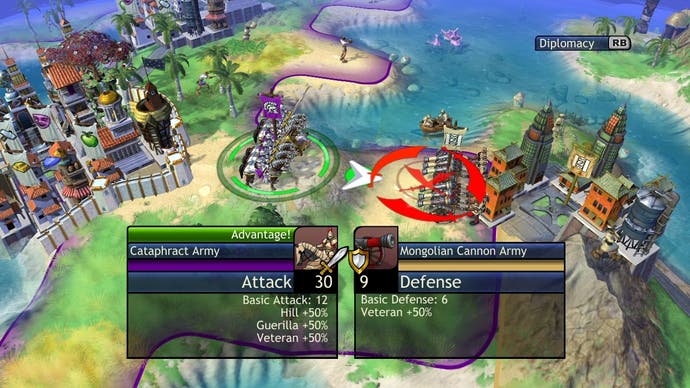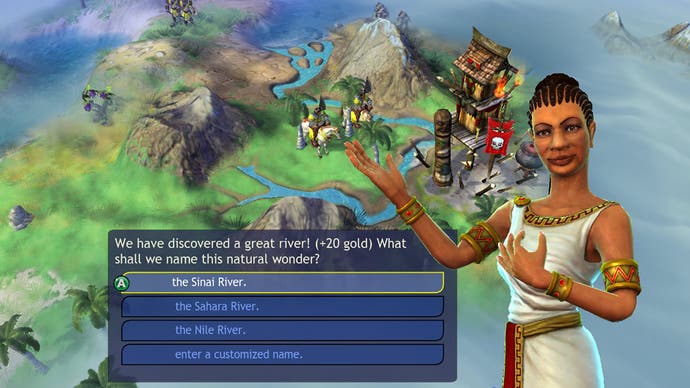Sid Meier's Civilization Revolution
Reinventing the wheel.
Hopefully yesterday's surprise announcement of Civilization IV: Colonization has quietened strategy gamers' hysteria that this cartoonish, slimline version of Sid Meier's favourite (or at least most lucrative) son might be the long-running series' only future. You don't get much more niche than an out-of-the-blue sequel to a 1994 turn-based PC game about trading rum between America and Europe, after all.
Well, hey. Already I'm probably confusing people who don't know much about Civ. In fact, over two previews, I've talked about how Civ Rev feels, and about how this console rethink differs from more than a decade of PC Civilizations, but what I haven't done is say how it's played. So, for total newcomers, let's take it from the top.
Civilization is all about tribalism. It begins with the most barbaric aspect of that (quite literally, hairy blokes with wooden clubs hitting other hairy blokes with wooden clubs) and ends with its other extreme - asserting your tribe's dominance over others through technology, culture, commerce or military might. In other words, you pick a nation and progress it from cave-dwellers all the way to factories and tanks.
To do this, you explore the world, you research new scientific advances, you found and improve cities, you shake hands with foreign dignitaries - or you wave your clubs/swords/lances/rifles/machineguns/nukes at anyone who stands in your way. It's all turn-based, your puppet-like armies marching across the land square-by-square, and a raft of numbers gradually raising and lowering - ideally the former. There's honestly no reason for it to be otherwise. You need that time and headspace to choose what you want each of your cities to be building, to decide whether invading Norwich is a smart move or not, and to prepare yourself in the event that an army of Zulu cannons starts rolling your way. You'll win because you think better, not because you react faster.

Me, I tend to be a pacifist in these things. Given the choice, I'd rather head to a quiet corner of the planet, get my head down and build an empire off my own back - not by greedily seizing land and coin from others. Civ Rev thus takes some getting used to. It's simply not possible to play it like that. This is inescapably a competitive game - one in which you're nose-to-nose with your rivals at all times. If you're doing well, your rival nations - each as determined to rule this tile-based world as you are - will constantly threaten you with annihilation if you don't relinquish your treasures.
The demands start small, but grow to unreasonable with alarming speed. No, Ghandi, you can't have 500 gold. No, Queen Elizabeth, I'm not going to give you the secrets of steam power. No matter how placid I try to act - will 200g be enough to satisfy the bloke in the nappy? Would Currency keep Queenie quiet? - it'll come down to capitulation or war soon enough. I've played a couple of dozen games of Civ Rev now, but there hasn't been a single one in which I haven't ended up having a barney with a hysterical neighbour or three. In most, I've usually ended up actively wiping out other Civs just to keep them from my own door.

Because that's the thing. You can't play Civ Rev like Civ. The underlying systems are the same, if hugely (and at times brutally) simplified, but where its PC siblings could, to a certain extent, be played at your own pace, this sticks army ants in your bed. If you try to sleep, you'll be eaten alive. It keeps moving at all times, and if you don't move with it you won't get anywhere. That said, the lowest couple of difficulty settings are almost hilariously forgiving, but you'll very quickly want to graduate to a more challenging one. Even if you're specifically aiming for an economic, cultural or technological victory, be prepared to shed some blood along the way.
While I miss the option for subtlety, this pushiness makes perfect sense, and is really the only way to ensure a match comes to a satisfying conclusion within a couple of hours. It's also a smart move for a game that may struggle to entice a brand new crowd. Offending existing Civ fans (and it will - the angrier, snobbier ones at least) by throwing too many nuance-babies out with the bathwater is one thing. Being perceived as too stuffy, too slow, too turn-based strategy by the mainstream console crowd - now that would be disastrous.




